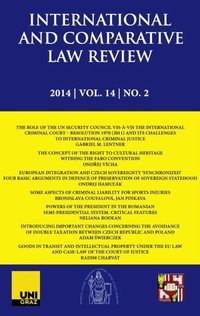Human Trafficking Analyzed as a Crime Against Humanity
Human Trafficking Analyzed as a Crime Against Humanity
Author(s): Autumn D. TolarSubject(s): Criminal Law, International Law, Human Rights and Humanitarian Law, Labor relations, Court case, Asylum, Refugees, Migration as Policy-fields
Published by: Univerzita Palackého v Olomouci_1
Keywords: human trafficking; crimes against humanity; international criminal courts; Myanmar; forced labor; Rome statute; icc; icty; ictr; jurisdiction;
Summary/Abstract: The global legal landscape recognizes the seriousness of human trafficking crimes yet many cases remain unheard. Current classifications of this crime along with jurisdictional requites for the International Criminal Courts are preventing adjudication of trafficking in persons when there is a factor of transnationality. I argue that the solution to positioning human trafficking into the jurisdiction of the International Criminal Courts is to analyze its rise to the level of a crime against humanity. Until this point, there has not been a human trafficking case well suited to make this argument to thoroughly demonstrate all the elements required to be classified as a crime against humanity. I argue that not only does the cross examination of human trafficking, under the Trafficking Protocol and the enumerated acts of Article 7(1) of the Rome Statute, meet the elements of a crime against humanity, but that the recent human trafficking situation of the Rohingya people in Myanmar further demonstrates its potential application and necessity. Classifying human trafficking as a crime against humanity would put these cases in the jurisdiction of the International Criminal Courts which would give previously domestically neglected cases an opportunity to be prosecuted and potentially deter the growing human trafficking epidemic.
Journal: International and Comparative Law Review
- Issue Year: 20/2020
- Issue No: 1
- Page Range: 127-152
- Page Count: 26
- Language: English

